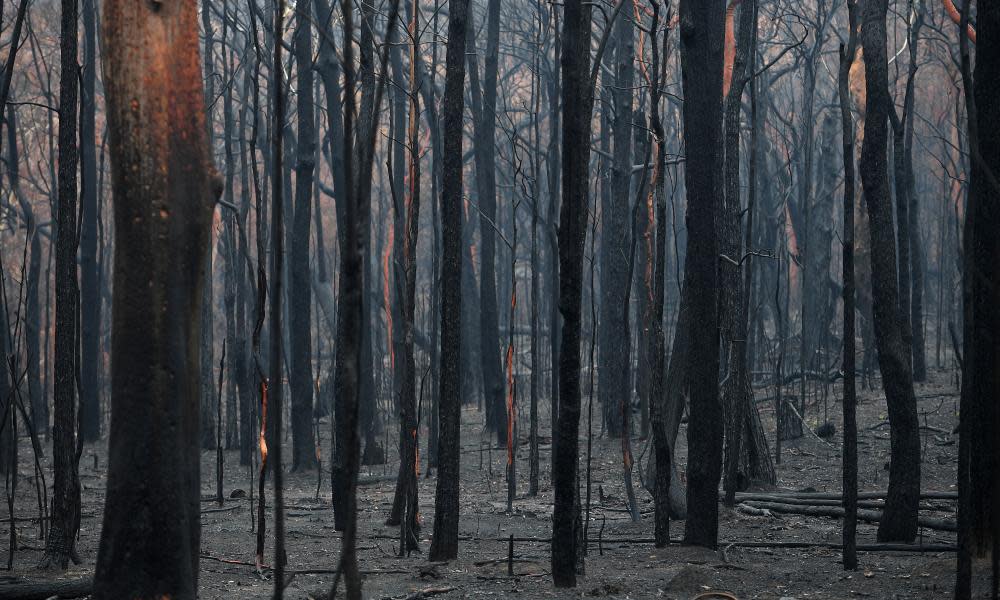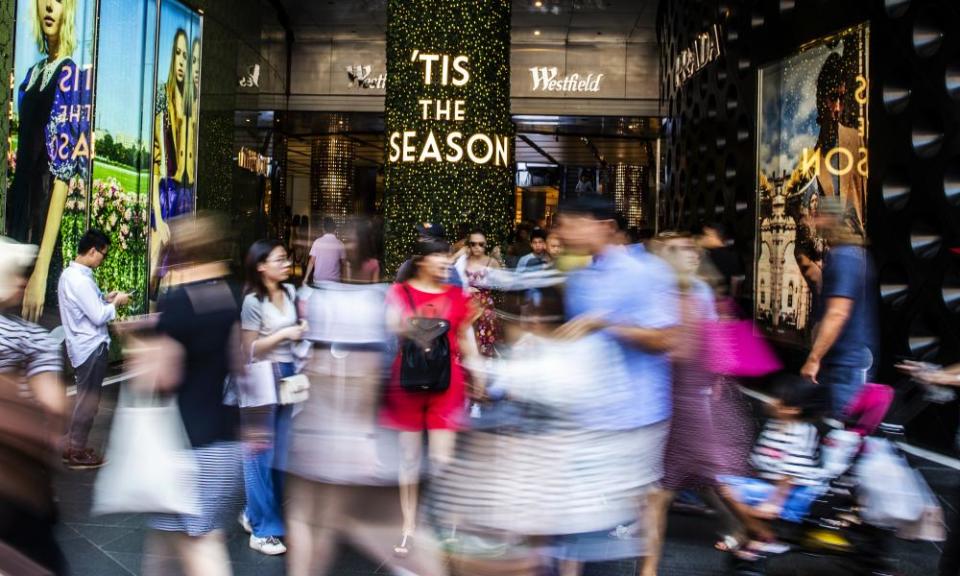Most Australian chief executives believe climate crisis a threat to business

Australian company bosses are becoming increasingly concerned about the climate crisis and are expecting tough economic times in the year ahead, a new survey shows.
Global accounting firm PwC’s annual survey of CEOs shows bosses are preparing to cut jobs and don’t think Australian business and government is doing enough to deal with global heating – a dismal picture that is set to get worse once the effects of the past month’s deadly bushfires take hold.
Economists expect the damage to industries including tourism, agriculture and retail from the unprecedented fires to carve up to 0.2 percentage points from Australia’s already anaemic growth figures.
Experts say the damage to the tourism sector is likely to top $1bn, and there is little likelihood that sales figures will show that Christmas revived a retail sector struggling to hold on as consumers who haven’t enjoyed a pay rise for years keep their wallets firmly shut.
Related: David Attenborough calls Australia's bushfires 'the moment of crisis' to address climate change
In September and October, before the bushfires peaked, PwC surveyed 1,600 CEOs around the world, including 117 Australians.
Even then, 65% of Australian bosses said climate change was a major threat, up from 60% last year and 43% a decade ago.
“The fact that it’s actually now in the top 10 of our CEO survey, not only in Australia but in many other markets, says this is something that’s not going away and it’s a genuine threat to our economy and our communities,” PwC Australia’s head of energy, utilities and resources, Mark Coughlin, said.
“We actually just have to get on with it.”
The proportion of Australian CEOs expecting global economic output, or gross domestic product, to drop has skyrocketed from 7% two years ago to 59% this year. With confidence that customers will spend thin on the ground, a whopping 77% are planning “operational efficiencies” – corporate code for cuts.
This includes a quarter of CEOs who plan to cut jobs, a potential further blow to an economy where the unemployment rate remains stuck above 5%.

Economists are pessimistic about the chances of an improvement any time soon, with Deloitte Access Economics predicting GDP growth will remain stuck at 2% for the rest of the financial year – well short of the 2.75% predicted by the Morrison government at the last federal budget and less even than the 2.25% estimate delivered in December.
ANZ estimates the bushfires will carve o.1% to 0.2% off GDP growth, but the bank’s chief economist, David Plank, said the full effect wouldn’t be visible until GDP figures for March were released in June.
The bushfires are unusual because natural disasters usually have little effect on GDP, which Plank said was a “pretty flawed way of measuring these things”, as it didn’t take into account the losses of forests and animals or people’s homes and businesses.
“We basically said it’ll be a larger impact given the sheer size of the event and the global news around it,” he said.
He said ANZ credit card data indicated a “quite weak” Christmas shopping season – further bad news for a retail sector rocked by a series of failures, including the collapse last week of fashion chain Jeanswest.
Some of the weakness may be due to the rising popularity of Black Friday moving sales forward into November, and some may be due to smoke haze, Plank said.
“It’s very hard to disentangle – I don’t think we’ll ever be able to,” he said.
Australian Tourism Industry Council executive director Simon Westaway said the bushfires would cost his sector “at least $1bn through the firestorms and down-the-line impacts”.
He said there had been an immediate “significant drop in domestic travel to many Australian regions, fire affected or not”.
Related: Australia's bushfires could affect cost and availability of fresh local produce
“It has remained hard to get a full estimate but based on the collective insights coming from the major tourism and accomodation bodies it will rise above $1bn, not fully factoring in retail and hospitality spend losses.”
The fires also hit farmers hard, forcing them to shoot thousands of injured animals and disrupting the dairy industry in southern NSW.
Bega chairman Max Roberts said milk was now getting off dairy farms but getting to and from the company’s processing plant remained difficult because the road south to Victoria remained cut.
Trucks bringing supplies in and products out of the factory were detouring through Canberra, he said.

“With our current rules on log books it makes a one-day trip into a two-day trip,” he said. “There’s certainly a cost associated with that but it’s not insurmountable.”
He said the fires cut all three main highways in the area at the same time – an “unusual” event, even though in the past two out of three have been simultaneously blocked by floods.
“It’s an event that will change how we do things,” he said. “I think hopefully the whole debate about how we handle climate will get some sensibility about it.”
However, PwC’s survey shows that just 12% of Australian bosses think government and business are working together effectively to deal with climate change risks, a figure that has barely moved in five years.
“The public discourse in Australia has been very challenging … around energy, climate, etcetera,” Coughlin said.
“That really doesn’t help. When I go to meetings around the globe, particularly in western Europe, climate sciences, risks, opportunities etc has been part of the dialogue for a decade or more.
“They’re talking much more about net zero [carbon emissions] where we’re debating the impacts or otherwise.”

 Yahoo News
Yahoo News 
